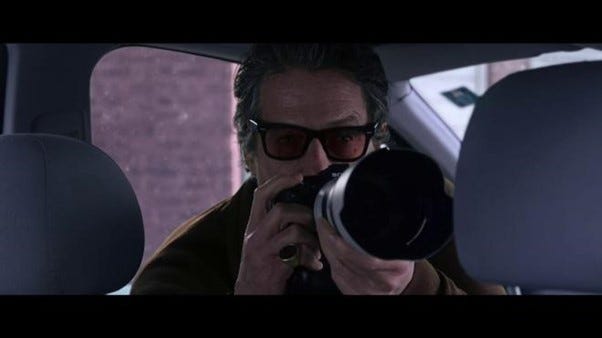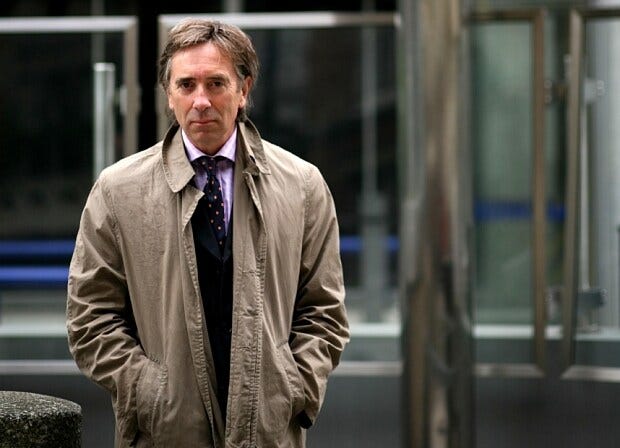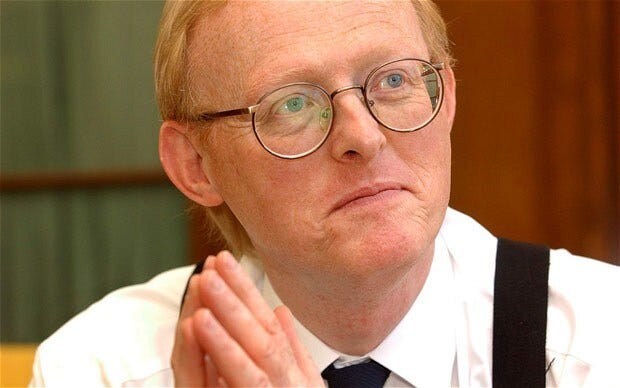Hugh Grant as muck-raking journo Fletcher in ‘The Gentlemen.’ Hugh, incidentally, is a big supporter of Media regulation.
There’s a story here in the UK – a tragic story – which descended into a three-ring circus. It’s a circus of recrimination, speculation and bile. It’s horrible. No good can come from it.
You know the one.
The protagonists are police officers, ex-police officers, journalists, politicians, experts both real and imagined, people wearing tinfoil hats and a social-media addicted public. I’m not much of a Twitter fan at the best of times, but the ‘toilet wall of the internet’ really disappeared down the U-bend this time. I open the app, sigh, then close it again.
My thoughts are with the family concerned.
Although I won’t comment on the case - what would be the point? - it did prompt me to consider Police / Media relations. Discussing the Media is an issue where people are often accused of having an agenda, so I’ll set out my stall straightaway;
I worked as a detective on the Met’s News International investigation and have a fair understanding of Leveson and the wider media context; I encountered excellent journalists and a few pirates too. I also witnessed senior media figures (irony alert) closing ranks in a way cops might find familiar. That included chucking people under buses.
I think the operation could have - and should have - been handled differently.
Yes, there was dodgy-dealing between police officers (at all ranks) and the media. And as usual - this is another theme of my writing - the baby of media relations was thrown out with the bathwater. The relationship was soured, possibly irrevocably and with profound consequences (more of which later). From my perspective, the UK Press have been increasingly hostile to police ever since. Once you’re under the Eye of Sauron, it’s difficult to escape.
I’m certainly not a journalist-basher. I’ve friends and family in the industry and realise it’s a messy, cutthroat business. I actually respect those hardy souls still able to make a living as a hack. Proper journalism, mind you, not clickbait bullshit or the ‘sidebar of shame.’
In the digital era the ‘Media’ is such a multi-tentacled beast it’s difficult to categorise or generalise. What, nowadays, is a journalist anyway? Anyone can upload a story to the internet from their phone and declare themself a ‘citizen journalist’. Bear that in mind when reading the rest of this article - if anyone can be a journalist, who are the police meant to speak to? Who decides?
My position on press freedom’s pretty straightforward; those who wish to ‘control’ or regulate the Media should be careful what they wish for. When the cancer of censoriousness spreads, the media is part of our national immune system. On the other hand, people maligned or treated unfairly absolutely deserve a proper avenue for redress. Balance is all.
Too many in the Media hold double standards. As an ex-policeman, it’s funny when journalists clutch their pearls at police culture when their own is similarly toxic. If you’re in the industry you know exactly what I’m talking about. Physician heal thyself. Especially when it comes to intrusion of privacy.
I also know a police legend about the reason why a famous editor hates Old Bill with such fiery passion, possibly informing his paper’s coverage for the rest of his tenure. It involved a vehicle stop on Chiswick High Road by an overly-officious police officer who took umbrage at the editor for sounding his car horn. It’s amazing how one unfortunate encounter with authority can inspire middle-class Englishmen to greatness. Apparently the barrister Michael Mansfield felt the call to fight injustice after being stopped by a surly traffic rat.
Martin Brunt, Sky’s weather-beaten crime reporter. I’d watch him standing outside Scotland Yard, waiting for something to happen. He usually looked bloody freezing.
I’ve read articles by journalists like John Sturgis and Martin Brunt, citing the ‘good old days.’ They’re referring to the pre-Leveson world, when journalists and coppers enjoyed a less formalised relationship. This school of thought can be summarised thus;
In Days of Yore, a hack could visit his local nick for a cuppa and be briefed on any cases of interest. This exchange of information led to balanced reporting and increased public engagement with police. Then, upstream, top-end crime journalists would be brought into the confidence of senior investigating officers on major cases. Sensitive issues might be shared, on the understanding they wouldn’t be revealed until some point in the future. More importantly, damaging information wouldn’t be released. And, even if it were, it would be managed in context.
As a lowly constable, I remember a ‘safety first’ attitude to the Press. For example, on one occasion I was one of several officers dealing with a major traffic accident. A radio reporter appeared in an outside broadcast van, showed me his press card and politely asked if I could help with his traffic bulletin. That made complete sense to me - how frustrating is it being in a jam not knowing what’s going on? - so I told him (off-air) how long it might take for us to clear the scene. I subsequently got a bollocking, as standing orders were to call an inspector to deal with reporters. What a load of old balls, eh? And this was back in 1993. So I understand why hacks get frustrated with the police when even innocuous encounters become problematic. I was frustrated too.
Then I went on to spend a decade or so in counterterrorism. I held Developed Vetting status. Given the sensitivities, it was only right there were restrictions on people of my rank speaking with the Media.
Anyhow, let’s take Mr. Sturgis’s word that things used to better, at least outside my little corner of policing. After all, I’ve never been an SIO or formulated a media strategy. I have, though, broken bread with detectives at all ranks who’ve dealt with journalists on high-profile cases. They all agree getting in bed with the media is risky. Yes, you can generate new witnesses and great PR… but journalists, unsurprisingly, aren’t charity workers. They want something in return. I know of one case where a newspaper got wind of an operation and ‘requested’ access into the proactive phase. If the police refused, the newspaper said it would have no choice but to run a story. Maybe not everything, but something. Nice operation you’ve got there. Be a shame if something happened to it…
Sounded like a threat to me.
Then, having worked on the Hacking Inquiry, there’s what I’d call ‘Lobby Syndrome’, which is analogous with the situation between Scotland Yard and a coterie of journalists and editors pre-Leveson. The Lobby, if you aren’t aware, are officially-accredited journalists covering Parliamentary affairs. They enjoy privileged access to official briefings and, as such, are often accused of having a too-cosy relationship with Government. Are they expert correspondents whose specialist knowledge adds genuine context, or a self-regarding club, too close to their subjects?
Concerns over the pre-Leveson relationship between Scotland Yard and News International were similar. Like the Lobby, it faced allegations of opacity. Why should only an elite cadre of journalists have the ear of senior officers? What about reporters who want to ask difficult questions? In a semi-covert, transactional relationship all sorts of skulduggery can be alleged. You can get a flavour of it here.
I was once invited to leaving drinks for a Scotland Yard press officer, circa 1999 or thereabouts. It was at The Monk Exchange on Strutton Ground, in case you’re wondering (happy days, eh?). I was introduced to the crime correspondent of a tabloid newspaper. He was, as you might expect, charming, roguish and happy to buy me a drink. To be fair, he was too silky to ask me anything sensitive but happily shared a story about a rival newspaper’s editor summoned to the Commissioner’s office for a bollocking. The editor had apparently published something sub judice, threatening criminal proceedings as a result. I considered the crime correspondent indiscreet, which made me wonder: why would a police officer deal with such a gossip? (answer - money) Don’t get me wrong - police officers can be terrible gossips. As the old saying goes, ‘a secret is something a policeman tells one person at a time’. But we’d only gossip with people we trusted. Hard-won trust. Not the ‘over a couple of pints’ sort of trust.
In journalism, though, I guess this how it works. I tell you something, you tell me something. I didn’t bite and so the journalist moved on to somebody else. I was a source handler and no stranger to elicitation tactics.
After Leveson, I remember the Met’s policy on contact with journalists went seriously North Korean. Missives posted on the Met’s intranet made it clear - journalists were toxic. Talking to them was confined to a select few. It was like the movie ‘Fight Club’ - the first rule of which is? You don’t talk about Fight Club. This was Commissioner Bernard Hogan-Howe’s policy, not least because Leveson partly led to his predecessor’s downfall. Bernie’s old-school. He struck me as the sort of man who trusts no one except himself and his horse.
So I understand why journalists became increasingly frustrated. I also think Hogan-Howe’s approach was mistaken. Strategically, his policy pissed-off the entire UK media. And as Mark Twain said, “don’t start an argument with someone who buys ink by the barrel.” Then what happened? The Police burnt their bridges with the Media just when it needed them most. Why? It’s 2012 / 2013.
Enter Tom Winsor, the New Chief Inspector of Constabulary and Butcher of UK Policing.
Tom Winsor, the bogeyman of British policing. Many would describe him, along with Theresa May, as architect of the many problems currently facing law enforcement
This isn’t the time or the place to go over the Winsor Report in great detail. Suffice it to say, Theresa May was tricked into taking the job of eviscerating the UK police budget by George Osborne. Osborne thought this would make the Home Secretary unpopular and scupper her chances, come the day, of succeeding David Cameron as PM.
How did that work out, George?
Winsor was May’s chosen hatchet-man. Then, to add insult to injury, she made him Chief Inspector of Constabulary.
In any case, the government media machine turned on the Police to justify Winsor’s implementation and his subsequent appointment, spinning anti-police stories about laziness, privilege and intransigence. The mood music was unambiguous, the post-Thatcher Tory ‘kicking’ the boys and girls in blue had coming since Ken Clarke failed in the early 90s. Chief Constables, whose pay was never in contention, turned a blind eye - cheaper coppers meant more coppers, right?
Remember the whole ‘Cry Wolf’ episode at the Police Federation conference? Remember May’s posturing on stop and search? Remember the stories of extravagant police pay and Spanish practices? The Police, especially the toothless Federation, had no communications strategy to counter the Home Office’s whispers. The police had no friends in the Press. No influence in newsrooms or editorial meetings. No eyes or ears in Westminster’s restaurants and clubs, places where civil servants pour poison into opinion-formers’ ears.
What they did have, however, were hordes of knife-sharpening journalists who remembered Operation Elveden.
Oh well, Theresa May earns a fortune through speaking engagements. Hogan-Howe’s ensconced in the Lords. As for the Police? They struggle to recruit. The 20,000 officer ‘uplift’ is a joke. Police pay is 17% lower than 2010 and many experienced officers have left. Cuts meant the closure of hundreds of police stations. Direct entry meant senior officers with negligible experience are increasingly in charge. Disastrous management of vetting and professional standards only adds to the sense of crisis. And the Media continues kicking the police with the ferocious passion of a spurned lover.
So the three-ring circus continues, hate and rancour generating click-through revenue for big tech and social media platforms. Feasting on ignorance and titillation and misunderstanding, like maggots wriggling in dung.
Meanwhile, a bereaved family weeps. And the circus looks for somewhere else to pitch its big top.





On my Inspector’s course we had a few sessions with a journalist, who did some mock interviews. He impressed on us how easy it was to get officers to say the wrong things. Watching my colleagues (same for me I’m sure) mess up was a salutary experience. He should have been on the CID.
The few times I’ve been on TV also showed me how smoke and mirrors it all was, with editing, out of sequence filming, and slant leaving me with the impression that the media is a powerful tool for good or evil.
Police use the media and need their cooperation, but both sides need to limit their trust. Their agendas are different.
The police service and the media could in theory work in complete harmony. The police providing appropriate detail to the press so they can print interesting stories which sell papers/advertising. In return the media pass on police requests for information and crime prevention issues etc.
in my experience (retired in 2010) this worked reasonably well with local press and TV because if they printed information that you had provided confidentially then they would be starved of future stories. National media outlets were more difficult and not to be trusted. What did they care about you, your career or reputation, not much at all.
Since I’ve retired it seems that relations with all the media are much more difficult.
Off the record is now off the table to the detriment of both sides and the public, apart from maybe the criminals.....?